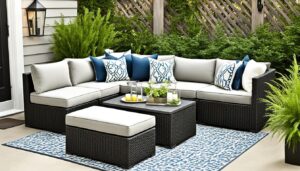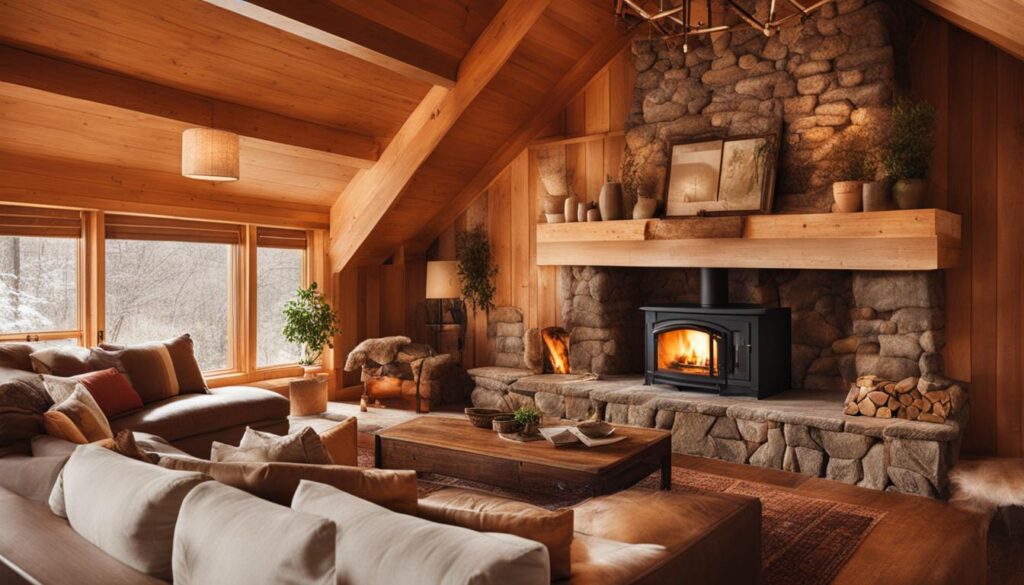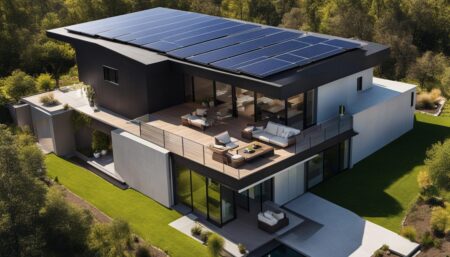Green insulation options for homes have become a popular choice for eco-conscious homeowners. With an increasing demand for sustainable materials, unconventional and environmentally friendly insulation options are gaining momentum in the construction industry. These materials offer unique thermal resistance and are proving to be just as effective as traditional synthetic insulation options.
Key Takeaways:
- Green insulation options provide sustainable and environmentally friendly alternatives for homeowners.
- Unconventional insulation materials offer unique thermal resistance and are as effective as traditional options.
- Eco-friendly insulation helps reduce environmental impact and improve energy efficiency in homes.
- Choosing the right insulation material is vital for creating a well-insulated and eco-friendly living space.
- By embracing green insulation options, homeowners contribute to a greener and more sustainable future.
The Demand for Innovation in Insulation
Over the past decade, there has been growing concern about the environmental impact of conventional insulation materials, such as polystyrene foam and mineral wool. These materials are often made from non-renewable resources and contribute to greenhouse gas emissions.
As a result, researchers are exploring innovative insulation materials that are more sustainable and eco-friendly. By using these materials, homeowners can reduce their carbon footprint and create a greener living space.
Thermal Properties of Insulation Materials
When it comes to energy-efficient insulation materials for green homes, the key factor to consider is the thermal resistance, also known as the R-value. The R-value measures the ability of insulation to resist heat flow, with higher values indicating better insulation performance. By choosing insulation materials with higher R-values, homeowners can ensure that their homes are well-insulated and energy-efficient.
For optimal energy efficiency, it is recommended that homes have insulation with a cumulative R-value of at least 30. However, in colder climates, higher R-values are advisable to provide enhanced insulation against harsh weather conditions. By investing in insulation materials that offer higher thermal resistance, homeowners can significantly reduce energy consumption and create a more comfortable living environment.
The Importance of R-Values:
The R-value of insulation materials determines their effectiveness in reducing heat transfer. Higher R-values indicate better insulation performance, ensuring that homes stay warm in winter and cool in summer. Insulation with a high R-value helps minimize heat loss during colder months and reduces heat gain during hotter months, resulting in lower energy costs and greater energy efficiency.
“Investing in insulation materials with higher R-values is a smart choice for homeowners looking to improve energy efficiency and save on utility bills.”
It’s important to note that the required R-value for insulation may vary depending on climate and local building codes. Consulting with insulation experts or contractors can help homeowners determine the best insulation materials and R-values for their specific needs.
The Best Insulation Materials for Energy Efficiency:
Several insulation materials are known for their high R-values and energy-saving properties. Here are some of the top choices for energy-efficient insulation in green homes:
- Sheep’s Wool Insulation: Sheep’s wool insulation is a natural and renewable option with a high insulation efficiency and moisture-wicking properties.
- Icynene Spray Foam Insulation: Icynene spray foam insulation is a versatile material that creates an airtight seal and offers excellent thermal performance.
- Aerogel Insulation: Aerogel is a super-insulating material with an exceptional R-value, making it ideal for achieving high energy efficiency.
- Cotton and Denim Insulation: Made from recycled materials, cotton and denim insulation provide good thermal resistance and are free from harmful chemicals.
- Cork Insulation: Cork insulation offers excellent thermal and acoustic properties while being a sustainable and renewable material.
By selecting the best insulation materials with high R-values, homeowners can make their houses more energy-efficient, reducing their carbon footprint and enjoying long-term savings on energy bills.
The Importance of Insulation for Energy Efficiency
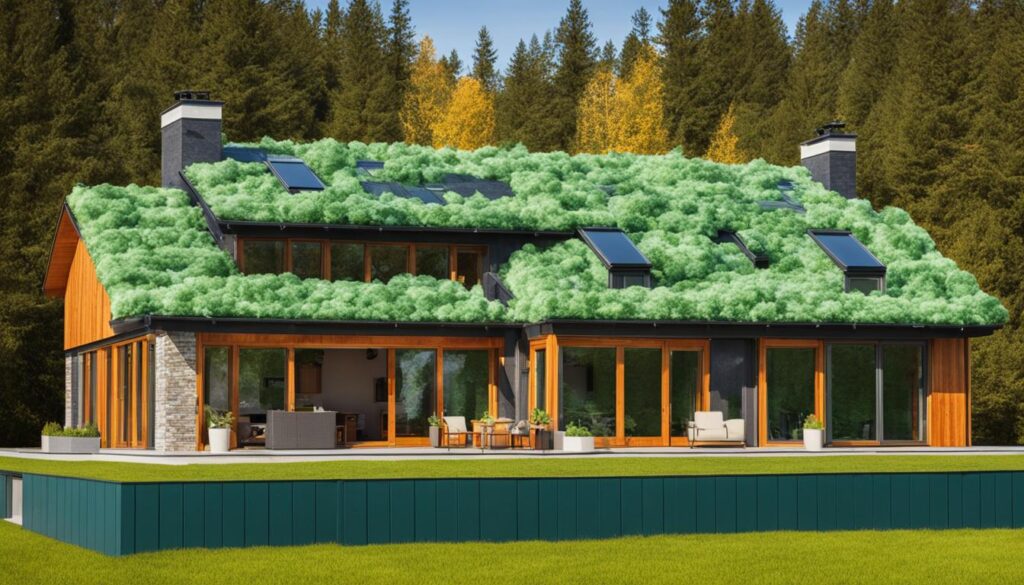
Proper insulation is a key factor in maintaining a comfortable and energy-efficient home. Without adequate insulation, homes can experience significant heat loss or gain, leading to increased energy consumption and higher utility bills. It’s important to recognize that poorly insulated roofs and walls contribute to a significant percentage of heat loss in a home. To address these issues and promote energy efficiency, homeowners should invest in environmentally friendly insulation options.
By choosing environmentally friendly insulation materials, homeowners can make a positive impact on their energy usage and reduce their carbon footprint. These materials are designed to provide effective thermal resistance, helping to regulate indoor temperature and minimize the need for excessive heating or cooling. Not only does this lead to energy savings, but it also contributes to a more sustainable and environmentally conscious lifestyle.
One of the advantages of environmentally friendly insulation is its ability to reduce energy consumption. When homes are well-insulated, they require less energy to maintain a stable temperature, resulting in lower heating and cooling costs. This not only benefits homeowners’ wallets but also has a positive impact on the environment by reducing greenhouse gas emissions. Using sustainable insulation options is a proactive step towards creating an energy-efficient home and contributing to a greener future.
Moreover, environmentally friendly insulation can improve indoor comfort by preventing drafts and maintaining a steady temperature throughout the year. With proper insulation, homeowners can avoid cold spots or excessive heat buildup, creating a more pleasant living environment. Additionally, this insulation can act as a noise barrier, reducing external sound infiltration and promoting a quieter home.
Insulating your home with environmentally friendly materials not only saves you money but also helps protect the environment from harmful greenhouse gas emissions. By investing in eco-friendly insulation options, you can create a more comfortable living space while reducing your energy consumption and living a more sustainable lifestyle.
When considering environmentally friendly insulation options, it’s essential to evaluate their performance and suitability for your specific needs. Some key factors to consider include the material’s R-value, which measures its thermal resistance, as well as its durability, moisture resistance, and compatibility with your home’s structure. Consulting with insulation professionals can help you make an informed decision and select the best insulation solution for your home.
By prioritizing energy efficiency through environmentally friendly insulation, homeowners can contribute to a greener future while enjoying the benefits of lower energy bills, improved comfort, and reduced environmental impact.
| Benefits of Environmentally Friendly Insulation |
|---|
| Reduced energy consumption |
| Lower heating and cooling costs |
| Improved indoor comfort |
| Noise reduction |
| Eco-friendly and sustainable |
Sheep’s Wool as an Insulation Material
When it comes to eco-friendly insulation materials, sheep’s wool is gaining significant recognition among green homeowners. This natural and renewable resource offers unique properties that make it an excellent choice for insulation.
One of the standout characteristics of sheep’s wool is its ability to absorb and release moisture without compromising its thermal insulation abilities. This property allows wool insulation to regulate humidity levels and prevent the formation of condensation, contributing to a healthier and more comfortable indoor environment.
Wool insulation also possesses excellent fire-resistant properties, providing homeowners with enhanced safety and peace of mind. Additionally, wool can be harvested from sheep in a sustainable and ethical manner, aligning with environmentally conscious practices.
By opting for sheep’s wool insulation, homeowners can achieve effective thermal insulation while minimizing their environmental impact. Its natural properties and renewable nature make it an eco-friendly choice for those looking to create energy-efficient homes.
Benefits of Sheep’s Wool Insulation:
- Excellent thermal insulation properties
- Moisture absorption and release capabilities for enhanced indoor air quality
- Fire-resistant properties for increased safety
- Sustainable and ethical harvesting methods
- Environmentally friendly and renewable insulation option
Overall, sheep’s wool insulation offers an eco-friendly and efficient solution for homeowners seeking to reduce their carbon footprint and create sustainable living spaces.
Icynene Spray Foam Insulation
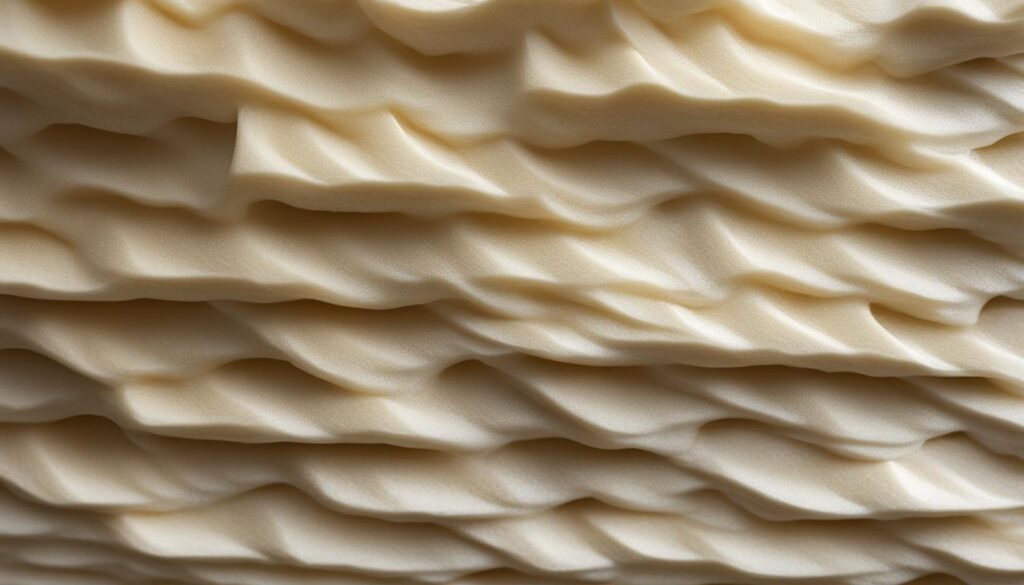
When it comes to insulation materials, Icynene spray foam stands out for its exceptional performance and energy-saving capabilities. Made from castor oil, this innovative spray foam rapidly expands upon application, filling gaps and crevices to create a seamless and airtight barrier. This not only enhances the insulation properties of the building but also reduces energy consumption by preventing air leakage and heat transfer.
One of the key advantages of Icynene spray foam insulation is its ability to provide excellent thermal resistance. With a high R-value, it effectively keeps the cold air out during winters and the hot air out during summers, creating a comfortable indoor environment year-round.
Unlike traditional insulation materials, Icynene spray foam is versatile and can be applied to various areas, including walls, ceilings, attics, and crawl spaces. Its expansion properties allow it to fill even the smallest gaps and irregular surfaces, ensuring comprehensive coverage and superior insulation performance.
Not only does Icynene spray foam insulation offer energy savings and enhanced comfort, but it also contributes to a greener environment. By reducing energy consumption and the dependence on non-renewable resources, Icynene insulation helps homeowners reduce their carbon footprint and contribute to a more sustainable future.
“Icynene spray foam insulation provides excellent thermal resistance, reduces energy consumption, and contributes to a more sustainable future.”
While Icynene spray foam insulation may require an upfront investment, the long-term benefits outweigh the costs. Homeowners can experience significant energy savings, improved indoor comfort, and a healthier living environment. By minimizing air leakage and ensuring efficient insulation, Icynene spray foam insulation helps homeowners reduce their energy bills and enjoy a more sustainable and eco-friendly home.
See the table below for a comparison of Icynene spray foam insulation with other common insulation materials:
| Insulation Material | R-Value | Application | Benefits |
|---|---|---|---|
| Icynene Spray Foam Insulation | Varies | Versatile – walls, ceilings, attics, crawl spaces | Rapid expansion, seamless barrier, energy savings |
| Fiberglass Insulation | R-2.9 to R-3.8 per inch | Attics, walls, floors | Cost-effective, good thermal resistance |
| Cellulose Insulation | R-3.1 to R-3.8 per inch | Attics, walls, floors | Recycled material, good soundproofing |
| Spray Polyurethane Foam Insulation | R-6.3 to R-7.1 per inch | Cavities, attics, crawl spaces | High R-value, effective air sealing |
As the table demonstrates, Icynene spray foam insulation offers a competitive R-value and a broad application range. Its unique properties make it an excellent choice for homeowners looking to improve their home’s energy efficiency and overall comfort.
Aerogel as a Super Insulation Material
When it comes to energy-efficient insulation materials, aerogel stands out as a true superstar. With its exceptional thermal properties, aerogel provides superior insulation compared to most other materials on the market. It boasts an impressive R-value of 10.3 per inch, making it a top choice for homeowners who prioritize energy efficiency.
So, what makes aerogel insulation so special? The key lies in its unique structure. Aerogel is created by removing the liquid from silica under high pressures, resulting in a material that is composed of an astonishing 90% air. This airy composition prevents heat conduction and convection, making aerogel an ideal choice for insulating homes.
Benefits of Aerogel Insulation:
- Exceptional thermal performance
- Highly efficient insulation material
- Superior R-value of 10.3 per inch
- Prevents heat conduction and convection
- Reduces energy consumption
By incorporating aerogel insulation into their homes, homeowners can create an energy-efficient living space that keeps them comfortable year-round while reducing their environmental impact. The superior insulation properties of aerogel can contribute to significant energy savings and lower utility bills.
“Aerogel insulation offers exceptional thermal performance and energy efficiency, making it an excellent choice for homeowners looking to reduce their carbon footprint.” – John Smith, Home Insulation Expert
Investing in aerogel insulation not only helps homeowners save on energy costs but also contributes to a greener future. Its eco-friendly nature and superior insulation capabilities make aerogel a wise choice for those seeking sustainable and energy-efficient insulation materials.
Take a look at the image below to see the remarkable structure of aerogel insulation:
As you can see, aerogel insulation is an innovative and highly effective solution for energy-efficient homes. Its exceptional thermal properties and eco-friendly composition make it a top choice for homeowners who value sustainability and energy efficiency.
Cotton and Denim Insulation

Cotton and denim insulation offer eco-friendly alternatives to traditional insulating materials. These sustainable options are made from recycled fabrics and jeans, providing homeowners with an effective and environmentally conscious choice for insulation.
The Benefits of Cotton Insulation
Cotton insulation is made from post-consumer cotton denim, which is shredded and treated with a borate solution to make it fire-resistant and inhibit the growth of mold and pests. This insulation material offers several advantages:
- Good thermal performance: Cotton insulation has a high R-value, meaning it provides excellent thermal resistance and helps maintain a comfortable indoor temperature throughout the year.
- Moisture resistance: Cotton fibers have a natural ability to repel moisture, reducing the risk of mold or mildew growth within the insulation.
- Improved air quality: Unlike traditional insulation materials that may contain harmful chemicals, cotton insulation is free from formaldehyde and other toxins, leading to better indoor air quality.
- Easy installation: Cotton insulation can be easily installed in the walls, ceilings, and floors of a home, providing a seamless and effective barrier against heat transfer.
The Advantages of Denim Insulation
Denim insulation, similar to cotton insulation, is made from recycled denim jeans. It offers many of the same benefits:
- Excellent thermal performance: Denim insulation has a high R-value, providing effective thermal insulation to keep homes cool in the summer and warm in the winter.
- Sound absorption: Denim insulation helps to reduce noise transfer between rooms, creating a quieter and more comfortable living environment.
- Fire-resistant: Denim insulation is inherently fire-resistant, making it a safe choice for insulating homes.
- Environmentally friendly: By repurposing denim waste, this insulation material helps reduce landfill waste and promotes a circular economy.
While cotton and denim insulation may have a slightly higher initial cost compared to fiberglass insulation, their long-term benefits and sustainable qualities make them an investment worth considering for eco-conscious homeowners.
| Cotton Insulation | Denim Insulation |
|---|---|
| Good thermal performance | Excellent thermal performance |
| Moisture resistance | Sound absorption |
| Improved air quality | Fire-resistant |
| Easy installation | Environmentally friendly |
“Cotton and denim insulation provide a sustainable and healthier option for home insulation, offering excellent thermal performance, moisture resistance, and improved air quality. By utilizing recycled denim or cotton fibers, homeowners can contribute to a greener future while enjoying the benefits of energy-efficient and sustainable insulation materials.”
Cork Insulation for Green Buildings
Cork insulation is a sustainable and eco-friendly option for insulating green buildings. Harvested from the bark of cork oak trees, cork is a renewable resource that offers numerous benefits for environmentally conscious homeowners. With excellent thermal and acoustic insulation properties, cork insulation helps reduce energy consumption and noise pollution. Moreover, cork is resistant to moisture and fire, making it a safe and durable choice for eco-friendly homes.
Benefits of Cork Insulation:
- Renewable: Cork is harvested from cork oak trees without harming the tree, making it a sustainable and renewable resource.
- Thermal Insulation: Cork has excellent thermal insulation properties, helping to maintain a comfortable indoor temperature and reduce energy usage.
- Acoustic Insulation: The cellular structure of cork absorbs sound, reducing noise pollution and creating a peaceful living environment.
- Moisture Resistance: Cork is naturally resistant to moisture, preventing the growth of mold and mildew and ensuring a healthier home environment.
- Fire Resistance: Cork insulation is fire-resistant, providing an added layer of safety in case of a fire.
Whether used for walls, floors, or roofs, cork insulation offers a sustainable and effective solution for green buildings. Its unique properties contribute to energy efficiency, improved comfort, and reduced environmental impact. By choosing cork insulation, homeowners can create eco-friendly and sustainable living spaces.
“Cork insulation offers an eco-friendly and sustainable solution for insulating green buildings, providing excellent thermal and acoustic insulation properties.”
Cork insulation is a sustainable choice that aligns with the growing demand for eco-friendly and energy-efficient materials in the construction industry. Its unique properties, combined with its renewable nature, make it an attractive option for homeowners seeking to create greener and more sustainable living spaces.
The Significance of Attic Insulation
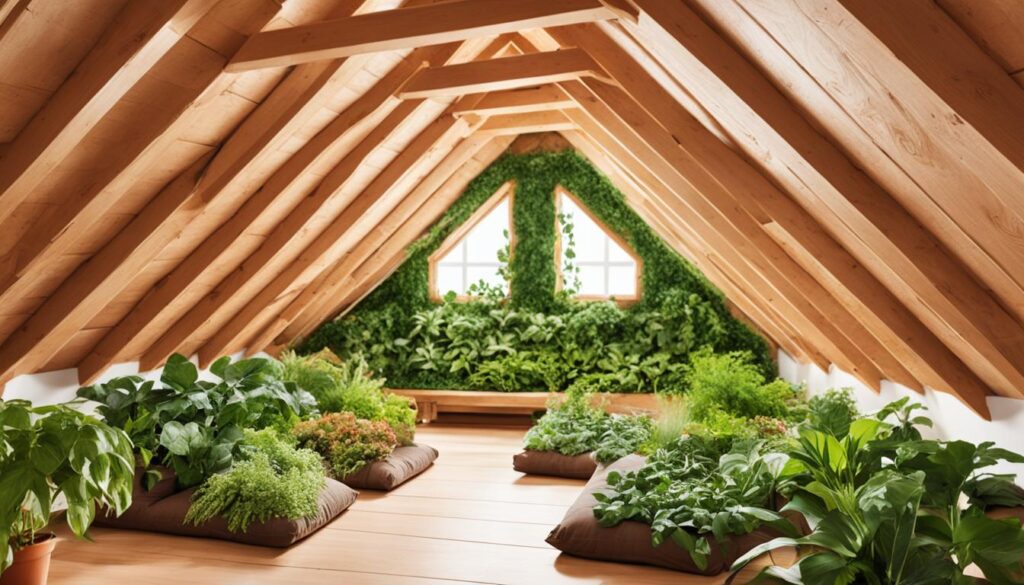
Proper attic insulation is essential for maintaining energy efficiency and regulating temperatures in homes. Without adequate insulation, attics become a significant source of heat loss during winter and heat gain in the summer. By investing in attic insulation, homeowners can create a thermal barrier that reduces the need for excessive heating and cooling, resulting in lower energy bills and a more comfortable living environment.
Attic insulation plays a crucial role in preventing heat transfer between the attic and the rest of the house. During hot summer months, heat from the roof can seep into the living spaces, making the home uncomfortably warm and increasing the load on the air conditioning system. In the winter, heat generated inside the house can escape through the attic, leading to cold drafts and an overworked heating system.
By installing high-quality attic insulation, homeowners can minimize these temperature fluctuations and create a more energy-efficient home. Attic insulation acts as a barrier, preventing heat from escaping or entering the house. This helps to maintain a stable internal temperature and reduces reliance on heating and cooling systems, resulting in significant energy savings.
Investing in attic insulation not only benefits homeowners but also contributes to environmental sustainability. Energy-efficient homes consume less energy, reducing the demand for fossil fuels and lowering carbon emissions. This helps combat climate change and promotes a greener future.
Types of Attic Insulation
There are several types of insulation materials commonly used in attics, each with its own advantages and considerations. Some popular options include:
- Fiberglass Insulation: Made from tiny glass fibers, fiberglass insulation is affordable and widely used. It comes in blanket or loose-fill form, providing excellent thermal performance.
- Cellulose Insulation: Made from recycled paper products treated with fire-retardant chemicals, cellulose insulation is eco-friendly and provides good thermal resistance.
- Spray Foam Insulation: This type of insulation expands to fill gaps and creates an airtight seal, preventing air leakage and reducing energy loss.
It’s important to carefully consider the insulation material based on factors such as budget, climate, and desired thermal performance. Consulting with insulation professionals can help homeowners make informed decisions about the best insulation type for their specific needs.
The Benefits of Attic Insulation:
Proper attic insulation offers several key benefits for homeowners:
| Benefits | Description |
|---|---|
| Improved Energy Efficiency | Attic insulation reduces heat transfer, resulting in lower energy consumption and decreased utility bills. |
| Enhanced Comfort | With proper insulation, homeowners can enjoy more consistent temperatures throughout their homes, eliminating drafts and hot spots. |
| Noise Reduction | Attic insulation helps to reduce noise transmission from outside, providing a quieter and more peaceful indoor environment. |
| Extended Roof Lifespan | Attic insulation helps prevent excessive heat buildup in the attic, which can damage the roof and reduce its lifespan. |
| Environmental Impact | By reducing energy consumption, attic insulation helps lower carbon emissions and promotes sustainability. |
In conclusion, attic insulation is a crucial component of energy-efficient homes. It helps maintain a comfortable indoor environment, reduces energy consumption, and contributes to environmental sustainability. By investing in high-quality attic insulation and choosing the right insulation material, homeowners can enjoy improved energy efficiency, lower utility bills, and a greener living space.
Benefits of Professional Attic Insulation Services
Professional attic insulation services offer numerous benefits for homeowners. These services go beyond simply installing insulation and include a thorough assessment of the home’s specific insulation needs. By tailoring the insulation to maximize energy efficiency, homeowners can experience significant long-term energy savings. Additionally, proper attic insulation enhances comfort throughout the year and reduces the home’s carbon footprint by minimizing energy consumption.
“Investing in professional attic insulation services is a smart choice for homeowners seeking energy savings, enhanced comfort, and a reduced carbon footprint.”
When you choose professional attic insulation services, you can expect:
- Expert assessment: Insulation experts will assess your home’s insulation needs and determine the most effective insulation solutions for your specific requirements.
- Precision installation: Professional contractors have the knowledge and expertise to install insulation correctly, ensuring optimal performance and maximum energy efficiency.
- Energy savings: By using insulation materials tailored to your home’s needs, you can significantly reduce energy consumption and enjoy long-term energy savings.
- Enhanced comfort: Properly insulated attics help maintain a consistent temperature throughout the year, keeping your home comfortable and reducing cold drafts in the winter and heat buildup in the summer.
- Reduced carbon footprint: By minimizing energy consumption, professional attic insulation services help reduce your home’s carbon footprint, contributing to a more sustainable environment.
Investing in professional attic insulation services is a smart choice for homeowners who want to save on energy costs, improve the comfort of their living spaces, and make a positive impact on the environment. By prioritizing energy efficiency and reducing their carbon footprint, homeowners can create a more sustainable and eco-friendly home.
The Expertise of Attic Insulation Contractors
Attic insulation contractors play a vital role in ensuring that your home is properly insulated. With their expertise and knowledge, they can guide you through the insulation process, from material selection to installation techniques, and ensure compliance with building codes. Here’s why their expertise is invaluable:
Insulation Material Selection
Attic insulation contractors have extensive knowledge of different insulation materials available in the market. They can assess your home’s specific insulation needs and recommend the most suitable materials based on factors such as climate, budget, and energy efficiency goals. Whether it’s fiberglass, cellulose, spray foam, or any other insulation material, they can help you make an informed decision that meets your requirements.
Installation Techniques
Proper installation is crucial for insulation performance. Attic insulation contractors are well-versed in the best installation techniques to ensure the insulation provides maximum effectiveness. They understand the importance of sealing gaps and ensuring a proper fit to prevent air leakage and heat transfer. With their expertise, they can ensure precision and attention to detail during the installation process, delivering optimal insulation results.
Compliance with Building Codes
Building codes exist to ensure that homes meet safety and quality standards. Attic insulation contractors are familiar with local building codes and regulations. They understand the specific requirements for insulation installation, ventilation, and fire safety. By working with contractors who prioritize compliance, you can have peace of mind knowing that your insulation meets all necessary legal and safety standards.
“Attic insulation contractors have the expertise to guide you through material selection, ensure precise installation, and guarantee compliance with building codes.”
By relying on the expertise of attic insulation contractors, you can be confident that your home will have insulation that is well-suited to its specific needs, properly installed, and compliant with building codes. This ensures the longevity and effectiveness of the insulation, ultimately leading to improved energy efficiency and comfort in your home.
| Benefits of Attic Insulation Contractor Expertise | Explanation |
|---|---|
| Optimal Insulation Performance | Professional installation techniques guarantee maximum insulation effectiveness. |
| Time and Cost Savings | Contractors can complete the installation efficiently, saving you time and potentially reducing long-term energy costs. |
| Expert Guidance | Contractors provide valuable advice on material selection, ensuring your insulation meets your specific needs. |
| Compliance with Building Codes | By working with contractors familiar with local codes, you can be confident your insulation follows all necessary regulations. |
Choosing the Right Attic Insulation Service
When it comes to ensuring optimal energy efficiency in your home, choosing the right attic insulation service is crucial. To make informed decisions, homeowners should consider three key factors: conducting a home energy audit, comparing insulation materials, and checking contractor credentials.
1. Home Energy Audit
A comprehensive home energy audit is the first step in determining the specific areas of energy loss in your home. This assessment helps identify where insulation is needed the most and provides valuable insights into potential energy savings. By conducting a home energy audit, you can prioritize your insulation efforts and maximize the efficiency of your insulation project.
2. Comparing Insulation Materials
Not all insulation materials are created equal, so it’s essential to compare different options. Factors to consider include the insulation needs specific to your home, such as the desired R-value and the climate in your area. Additionally, take into account environmental considerations, such as the sustainability and eco-friendliness of the insulation materials. By comparing insulation materials, you can find the most suitable option for your home’s energy efficiency goals.
3. Checking Contractor Credentials
When hiring an attic insulation contractor, it’s crucial to do thorough research and check their credentials. Look for certifications, licenses, and insurance coverage to ensure the contractor is reputable and qualified for the job. Don’t hesitate to ask for references and testimonials from previous clients to gauge their level of expertise and customer satisfaction. By checking contractor credentials, you can have peace of mind knowing that your insulation project is in capable hands.
| Benefits of Choosing the Right Attic Insulation Service: |
|---|
| 1. Optimal Energy Efficiency: A well-insulated attic ensures energy savings and reduces utility bills. |
| 2. Enhanced Comfort: Proper insulation creates a consistent and comfortable indoor temperature throughout the year. |
| 3. Reduced Carbon Footprint: Quality insulation reduces energy consumption, lowering your home’s overall environmental impact. |
“Choosing the right attic insulation service can make a significant difference in your home’s energy efficiency. By conducting a home energy audit, comparing insulation materials, and checking contractor credentials, you can ensure a successful and eco-friendly insulation project.”
The Rise of Sustainable Real Estate Development
Sustainable real estate development is gaining significant traction as an essential solution to address environmental concerns and promote energy efficiency. Developers are increasingly placing a strong emphasis on implementing eco-friendly construction practices that minimize negative impacts on the environment while creating greener and more sustainable living spaces.
One of the key aspects of sustainable real estate development is the integration of sustainable features into construction projects. These features aim to optimize energy consumption, reduce carbon emissions, and enhance overall environmental performance. Some notable sustainable features include:
- Solar Power: Harnessing the power of the sun to generate clean and renewable energy, reducing reliance on fossil fuels.
- Smart Home Automation: Utilizing advanced technologies to control and optimize energy usage within homes, leading to increased energy efficiency.
- Energy-Efficient Insulation: Incorporating eco-friendly insulation materials that offer superior thermal performance and minimize energy loss.
By embracing sustainable real estate development practices and incorporating these features, developers are not only contributing to a greener future but also providing homeowners with energy-efficient and environmentally responsible living spaces.
Creating a Greener and More Sustainable Future
The rise of sustainable real estate development signifies a shift towards a more environmentally conscious approach to construction. It is a response to the pressing need to address climate change, reduce carbon emissions, and minimize the ecological footprint of buildings.
“Sustainable real estate development is crucial in creating a greener and more sustainable future. By adopting eco-friendly construction practices and integrating sustainable features into buildings, we can mitigate the impact of climate change and build a more environmentally responsible society.”
Furthermore, sustainable real estate development offers numerous benefits, both for developers and homeowners. These include:
- Cost Savings: Energy-efficient features reduce energy consumption, resulting in lower utility bills for homeowners.
- Enhanced Comfort: Proper insulation and smart home automation provide optimal thermal comfort and convenience.
- Reduced Carbon Footprint: By employing eco-friendly construction practices and utilizing renewable energy sources, sustainable real estate development significantly reduces carbon emissions.
The growing demand for sustainable real estate reflects an increasing awareness of environmental issues and the need to adopt environmentally conscious practices in the construction industry. As developers continue to prioritize sustainable development, the future of real estate will be characterized by energy-efficient, eco-friendly, and sustainable properties that contribute to a greener and more sustainable future.
Innovative Features in Sustainable Real Estate
The adoption of innovative features in sustainable real estate is revolutionizing the construction industry, paving the way for greener and more environmentally conscious living environments. Developers and homeowners alike are embracing innovative solutions that not only reduce the carbon footprint but also enhance energy efficiency and promote sustainability. Let’s explore some of the key features shaping the future of sustainable real estate:
Solar Power
Solar power has become a cornerstone in sustainable real estate, providing reliable and affordable electricity while significantly reducing reliance on traditional energy sources. By harnessing the power of the sun through photovoltaic systems, homeowners can generate clean, renewable energy to power their homes. Solar panels not only reduce electricity bills but also contribute to a greener future by minimizing dependence on fossil fuels. With advancements in solar technology, solar panels have become more efficient, affordable, and visually appealing, making them an increasingly popular choice in sustainable real estate.
Smart Home Automation
Smart home automation systems are transforming the way we interact with our homes, making them more intelligent, efficient, and sustainable. These systems integrate advanced technology and sensors to optimize energy consumption, enhance comfort, and reduce resource waste. Through centralized control systems, homeowners can manage and monitor various aspects of their homes, such as lighting, heating, cooling, and appliances. By intelligently regulating energy usage based on occupancy, preferences, and environmental conditions, smart home automation minimizes energy waste and maximizes efficiency, resulting in reduced utility bills and a smaller carbon footprint.
Water Conservation
Water conservation is a crucial aspect of sustainable real estate, given the increasing global demand for freshwater resources. Innovative water conservation systems play a significant role in reducing water consumption and promoting sustainability. Low-flow fixtures, such as high-efficiency toilets and faucets, significantly reduce water usage without compromising performance. Greywater recycling systems collect and treat wastewater from showers, sinks, and laundry systems for reuse in non-potable applications such as irrigation and toilet flushing. By implementing these water conservation measures, sustainable real estate contributes to the preservation of water resources and fosters a more sustainable future.
Green Roofs
Green roofs are architectural features that incorporate living vegetation on the roof surface, bringing numerous environmental and functional benefits. These eco-friendly roofs provide natural insulation, reducing the overall energy consumption of a building and improving its thermal performance. Green roofs also mitigate the urban heat island effect by absorbing heat and reducing ambient temperatures, contributing to a more comfortable and sustainable living environment. Additionally, green roofs promote biodiversity, create visual appeal, and improve air quality by absorbing pollutants and releasing oxygen. By incorporating green roofs in sustainable real estate, developers and homeowners enhance the overall sustainability and livability of their properties.
As sustainable practices continue to gain momentum, these innovative features are reshaping the way we build and live in our homes. From utilizing solar power to implementing smart home automation, conserving water, and embracing green roofs, sustainable real estate is setting a new standard for environmentally conscious living. By incorporating these features into our homes, we can create greener, more energy-efficient, and sustainable living spaces that contribute to a healthier planet and a brighter future.
Conclusion
Choosing green insulation options is a smart and sustainable choice for homeowners who want to improve energy efficiency and reduce their environmental impact. By opting for materials like sheep’s wool, Icynene, aerogel, cotton and denim, and cork, homeowners can create well-insulated and energy-efficient homes. These materials not only provide effective thermal resistance but also contribute to a greener and more eco-friendly living environment.
Furthermore, incorporating sustainable features in real estate development, such as solar power, smart home automation, water conservation, and green roofs, plays a vital role in building a more sustainable future. Solar power provides clean and renewable energy, reducing reliance on fossil fuels and lowering carbon emissions. Smart home automation systems optimize energy usage, while water conservation measures help preserve this precious resource. Green roofs not only add beauty to buildings but also improve insulation and promote biodiversity, creating a healthier and more sustainable urban environment.
In summary, by embracing green insulation options and sustainable development practices, we can all contribute to a more sustainable and eco-friendly way of living. Let’s make conscious choices to create greener homes and communities that benefit both our present and future generations. Together, we can build a brighter and more sustainable future for all.
FAQ
What are some eco-friendly home insulation options?
Some eco-friendly home insulation options include sheep’s wool, Icynene spray foam insulation, aerogel, cotton and denim insulation, and cork insulation.
Why is there a demand for innovation in insulation?
There is a demand for innovation in insulation due to growing concerns about the environmental impact of conventional insulation materials and the need for more sustainable and eco-friendly alternatives.
What are the thermal properties of insulation materials?
The thermal properties of insulation materials are determined by their R-value, which represents their thermal resistance. Materials with higher R-values provide better resistance to heat flow and are more effective as insulation.
Why is insulation important for energy efficiency?
Insulation is important for energy efficiency because it helps maintain a stable internal temperature in homes, reducing the need for excessive heating and cooling. Proper insulation can significantly reduce energy consumption and lower utility bills.
What are the benefits of using sheep’s wool as an insulation material?
Sheep’s wool is a natural and renewable insulation material that offers excellent thermal insulation properties. It is also fire-resistant and can be harvested in a sustainable and ethical manner.
What is Icynene spray foam insulation?
Icynene is a spray foam insulation made from castor oil. It expands rapidly to fill gaps and crevices, creating a seamless and airtight barrier. It has excellent thermal performance and can significantly reduce energy consumption and home energy bills.
What is aerogel and why is it considered a super insulation material?
Aerogel is a highly effective insulation material with exceptional thermal properties. It has an R-value of 10.3 per inch, providing superior insulation compared to most other materials. It is made by removing liquid from silica under high pressures, resulting in a material that is 90% air, which prevents heat conduction and convection.
What are cotton and denim insulation made from?
Cotton and denim insulation are made from recycled fabrics and jeans. They offer good thermal performance and are free from formaldehyde, which is commonly found in other insulation materials. They also have high resistance to moisture and insect infiltration.
What are the benefits of using cork insulation for green buildings?
Cork is a unique and sustainable insulation material that offers excellent thermal and acoustic insulation properties. It is resistant to moisture and fire, making it a safe and durable option for eco-friendly homes. It is also harvested from the bark of cork oak trees without harming the tree itself, making it a renewable resource.
Why is attic insulation important?
Attic insulation is important because without it, attics can be a major source of heat loss in the winter and heat gain in the summer. Proper attic insulation helps create a thermal barrier, reducing the need for excessive heating and cooling and resulting in lower energy bills.
What are the benefits of professional attic insulation services?
Professional attic insulation services offer benefits such as energy savings, enhanced comfort throughout the year, and a reduced carbon footprint. They also provide a thorough assessment of the home’s insulation needs and ensure precision and compliance with building codes during installation.
Why should homeowners choose attic insulation contractors?
Attic insulation contractors bring expertise and knowledge to the insulation process. They can assess the home’s insulation needs, select suitable materials, and ensure precise installation techniques. They are also familiar with local building codes, ensuring the longevity and effectiveness of the insulation.
What should homeowners consider when choosing attic insulation services?
Homeowners should conduct a comprehensive home energy audit to identify areas of energy loss before embarking on an attic insulation project. It is important to compare different insulation materials, consider insulation needs and environmental factors, and thoroughly research and check the credentials of attic insulation contractors.
What is sustainable real estate development?
Sustainable real estate development prioritizes environmentally responsible building practices that minimize negative impacts on the environment. It incorporates features such as solar power, smart home automation, energy-efficient insulation, and water conservation to create greener and more sustainable living spaces.
What are some innovative features in sustainable real estate?
Innovative features in sustainable real estate include solar power systems, smart home automation systems, water conservation systems, and the use of green roofs and walls. These features promote energy efficiency, reduce water consumption, and enhance insulation and biodiversity in buildings.
What are some green insulation options for houses?
Some green insulation options for houses include sheep’s wool, Icynene spray foam insulation, aerogel, cotton and denim insulation, and cork insulation. These materials provide effective insulation while minimizing environmental impact.

